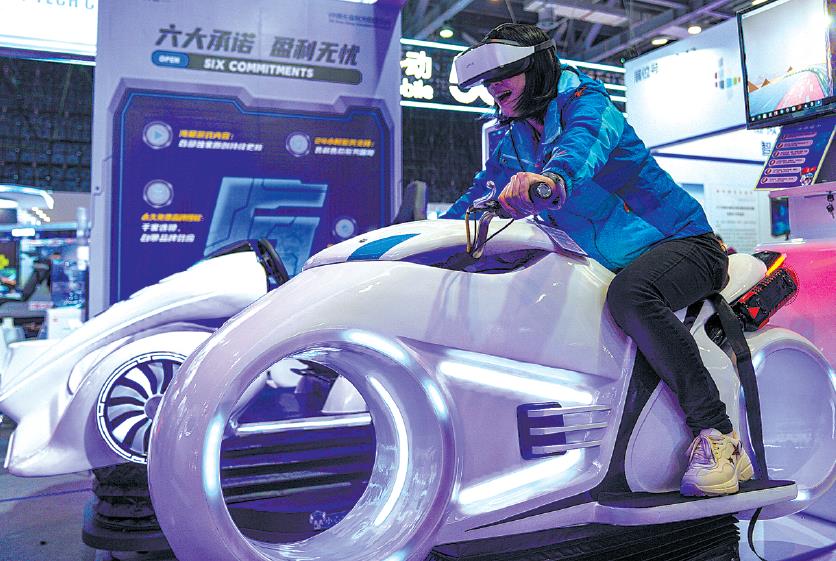Metaverse frenzy grips tech industry


China's preeminence in 5G network infrastructure and its rapid progress in artificial intelligence and cloud computing technologies can give it an edge in moving toward the metaverse, experts said.
The comments came as a meta-verse frenzy has taken hold of global tech entrepreneurs, and countries are eager to unveil policies to accelerate a virtual-tangible world integration.
The metaverse is basically a shared virtual environment in which technologies such as virtual reality and augmented reality are combined to create a sense of virtual presence.
As one of the hottest tech buzzwords, metaverse promises a future in which the virtual world and the physical world are inextricably interconnected, said Yu Jianing, executive director of the metaverse industry committee at China Mobile Communications Association, a Beijing-based industry association.
Though the concept is still in its infancy, metaverse is the next big thing after the mobile internet, and it will give rise to new businesses, bring profound economic changes and inject a fresh impetus into the integration of digital and real economies, Yu said.
"Metaverse is becoming the new battlefield for innovation competition," Yu added.
Jiao Juan, an analyst at Essence Securities, a Chinese securities company, said that compared with other countries, China is a quick mover in rolling out 5G networks and commercializing 5G technologies, which can give it an upper hand in laying down a sound infrastructure for the metaverse.
China has built more than 1.15 million 5G base stations as of mid-November, accounting for more than 70 percent of the global total, according to data from the Ministry of Industry and Information Technology.
Sihan Bo Chen, China head of the Global System for Mobile Communications Association, an international global telecommunications industry body, said that although views differ considerably on how the metaverse will unfold in the future, there is one thing for sure: 5G will play a very important part in realizing the vision.
"5G networks' capabilities, such as large bandwidth, low latency and high speed, are the foundation and an indispensable part of the metaverse," she said.
For instance, industry insiders have said that in the metaverse, people could move beyond the constraints of screens or beyond the limits of physics by teleporting as a hologram, or a 3D virtual figure, to be present with their colleagues or loved ones. Such a vision would be impossible without the support of 5G networks.
Sensing the rosy prospects, countries are moving fast to promote the growth of the metaverse. The Ministry of Industry and Information Technology said this month that it would soon unveil new policies to quicken the industrial use of virtual reality.
South Korea's Ministry of Science and ICT created a "metaverse alliance" in May to coordinate and facilitate the development of virtual and augmented reality platforms. More than 500 enterprises have joined the alliance so far.
In addition, the Seoul metropolitan government recently announced plans to establish Metaverse Seoul, a next-generation platform that will include a virtual city hall, tourism locations and social service centers. The project is part of the South Korean capital's Seoul Vision 2030 plan.
Xiang Ligang, director-general of the Information Consumption Alliance, a telecom industry association, said Chinese companies are making steady progress in cloud computing and AI computer algorithms, which can also help the nation move quickly toward the metaverse.
However, supporting technologies, application scenarios and business models for the metaverse are far from mature, and long-term efforts are needed to make it a reality, Xiang said.
- Survivor of Japan's 'comfort women' system dies, leaving 8 on Chinese mainland
- 19 foreigners among China's first officially certified hotpot chefs
- China approves new lunar sample research applications from institutions
- Fishing, Hunting festival opens at Chagan Lake in Jilin
- A glimpse of Xi's global insights through maxims quoted in 2024
- China's 'Ice City' cracks down on ticket scalping in winter tourism




































